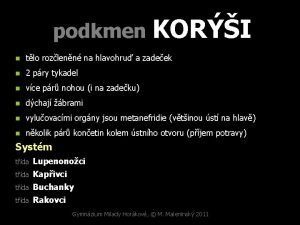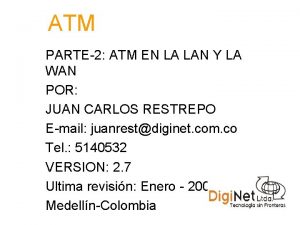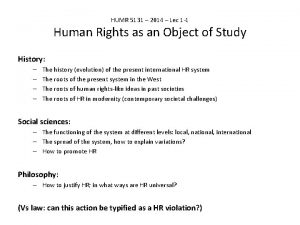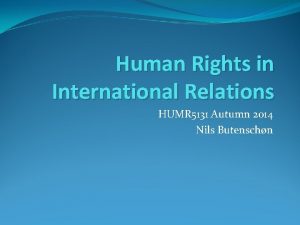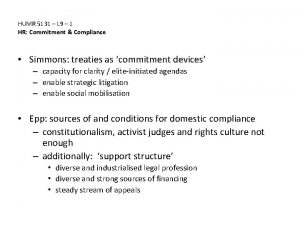HUMR 5131 2014 Lec 2 1 NonWestern Approaches






- Slides: 6

HUMR 5131 – 2014 – Lec 2 -1 Non-Western Approaches to Human Rights How can Human Rights be Universal? • The Tzeltal translation: By turning the UDHR into a book of counsel applicable to all • Deontological approaches: finding secure, norm-based arguments about morally required choices • Prudential and utilitarian arguments: HR promotes general welfare and a good order • Pragmatic (Nickel): HR is both socially and historically the existing and best answer to the challenges of modernity – the bureaucratic state – mass society – market economy

HUMR 5131 – 2014 – Lec 2 -2 Non-Western Approaches to Human Rights Se and Karatsu: A Japanese Approach Goal of article: to demonstrate a non-Western approach, to sensitivise the West, and to enrich Human Rights • Are HR ’Western’ (and justifiable in the West only)? – I. e. , individualising (v. communitarian), atomising, neo-imperialist, etc. – and prioritising civil and political rights? • What are the functions of HR? – Guaranteeing common conditions for the pursuit of the good life to all, equally – (cf. Nickel’s ’four secure claims: have a life, lead a life, etc. ) • Different views of ’self’ and morality – Japan: relational self, situation-based morality – The West: independent self, abstract moral principles • In both case however the goal is to mature and realise one’s potential

HUMR 5131 – 2014 – Lec 2 -3 A Japanese Approach: Se and Karatsu What is necessary for enabling such a maturing process? I. e. , construe a mature and realised self? Interdependent self construal: defining oneself with reference to others and to the situation Maturing in Japan is managing relations: a mother’s admonitions, learning empathy (omoyari) at school; internalising a generalised other through internalising others Not managing relations/situations: shame, loss of face Independent self construal: defining oneself with reference to abstract principles Maturing in the West focusses on the self; internalising a generalised other by deducing from abstract norms Not managing (not knowing morals): guilt, sin

HUMR 5131 – 2014 – Lec 2 -4 A Japanese Approach: Se and Karatsu • Human Rights (growing up in freedom and equality) is what guarantees the growth of both relational as well as independent selves • A formal theory of human rights: If all people are to pursue the good life, equally, all people must have secured the necessary conditions for maturing and self-realisation. To internalise the ’generalised other’ necessary for being mature, other people must have the same security • A Japanese addition: the right to be brought up in an intimate community

HUMR 5131 – 2014 – Lec 2 -5 A Mayan Approach Mayan Guatemala: A Communitarian society • The Komon: clans that move together • The Komon as an enabling environment: acquiring and practicing respect • Making government: respecting sacred equilibria • Clashes with the (nation-)state: A right to water? • Defending ourselves by writing constitutions • Rawasil: the way it should be; a blueprint of the Right Order • Awas: transgression and its consequences

HUMR 5131 – 2014 – Lec 2 -6 A Mayan Approach Justifying Human Rights in Mayan Guatemala? – The mature person is the person that is respected and that shows respect – Is respectability a basis for the pursuit of happiness? – How is respect acquired? – Can human rights ensure the conditions for acquiring respect? In a society where the people is the sovereign, probably not Ø Human rights both protect and destabilise the komon
